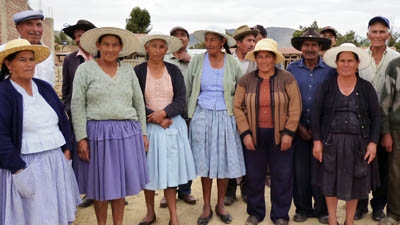June 12, 2012—The sun is about to rise in Cochabamba, a Bolivian city located over 8,000 feet above sea level. On a pasture field in a small community of dairy farmers, Hector Ferrel, a 75 year-old Bolivian producer, begins a new day at work with confident steps.
“I’ve been milking cows as far as my memory reaches back. Surely, I want to continue doing that until the day I die," said Mr. Ferrel with the serenity of one who has gone through much more difficult days.
Back in 2007, Mr. Ferrel and his 29 fellow farmers of the Punata Dairy Farming Association (Asociación de Lecheros Agropecuario Punata) led a very different life than they do today. Their malnourished cows barely produced 1200 liters of milk a day and their combined daily income only reached US$ 380.
Things began to change when farmers learned about the World Bank Rural Alliances Project (PAR in Spanish). PAR creates a sustainable economic partnership between associated producers and marketers. It works like this:
- Both parties come together and set a business plan.
- Buyers determine a product specification and agree on purchasing conditions. Buyers may also provide technical assistance to producers.
- Associated producers then request financing from the PAR. If approved, they must contribute 30% of the total investment cost.
- Each producer group that becomes a member of the alliance receives tailored funding to achieve the product specification required by the buyer, as well as institutional support to improve its managerial capacity.
Put another way, the project’s aim is to open the market to poor rural producers, and help them add value to their products, improve their income, foster fair trade and develop the economy of their community along the way.


